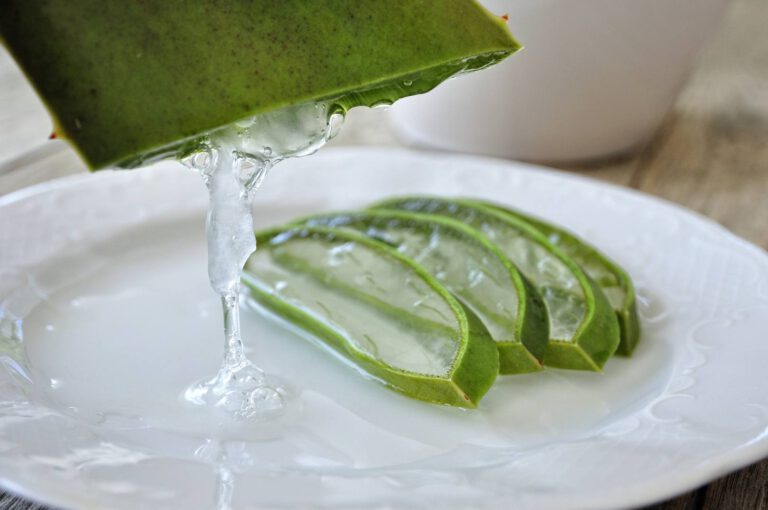Aloe juice – properties
Contents
- Aloe juice – a source of vitamins and minerals
- Properties of aloe juice
- How to drink aloe vera juice and possible contraindications to its use?
Almost everyone has heard of the beneficial properties of aloe vera. It's an ingredient in moisturizing and soothing hand creams, face creams, and lotions, among other things. However, these aren't all the properties this unassuming plant has to offer. Its beneficial effects on our bodies are much greater. So let's take a look at what we can achieve by regularly drinking aloe vera juice .
Aloe juice – a source of vitamins and minerals
Aloe, or aloe vera, is a plant with thick, fleshy leaves native to arid regions of Europe, America, Asia, and Africa. This plant is a source of valuable nutrients for humans:
- Vitamins – A, C and E, which are antioxidants, vitamin B12 and folic acid , and choline – an antioxidant that neutralizes the harmful effects of free radicals,
- Minerals such as: calcium, chromium, copper, selenium, magnesium, manganese, potassium, sodium and zinc.
- Enzymes such as: Bradykinase, which supports the treatment of skin inflammation, amylase, alkaline phosphatase, carboxypeptidase, catalase, cellulase, lipase and peroxidase, which support the body in the breakdown of fats and sugars,
- Sugar: glucose, fructose, glucomannan,
- phenolic compounds that have laxative, analgesic, antibacterial and antiviral effects,
- plant steroids such as cholesterol, campesterol, β-sizosterol and lupeol, which have antiseptic, anti-inflammatory and analgesic effects,
- Amino acids necessary for the proper functioning of the body
- Salicylic acid with antibacterial and anti-inflammatory properties.
Properties of aloe juice
Aloe juice is valued for its health-promoting effects on our body. It supports, among other things:
- proper functioning of the digestive system,
- proper functioning of the kidneys and liver,
- Slimming process by accelerating metabolism,
- Relieves the symptoms of inflammation of the digestive system, ulcers and gastritis by regulating the pH of the stomach.
- supports intestinal function in cases of constipation and has laxative properties,
- improves and supports the proper function of the intestinal villi, which are responsible for the proper absorption of all nutrients,
- improves the function of the immune system and thus supports the body in the fight against viruses and bacteria,
- lowers the level of bad cholesterol, helps regulate blood pressure and thus supports the proper functioning of the cardiovascular system.
When applied externally, aloe vera juice also has a positive effect on skin and hair. When used with facial cleansing, it has a toning, moisturizing, and regenerating effect on damaged skin. The juice can also help relieve inflammation in the mouth. When applied to hair, it strengthens and conditions it. How to drink aloe vera juice and possible contraindications to its use.
How to drink aloe vera juice and possible contraindications to its use?
Aloe juice should be used according to the manufacturer's enclosed package insert. Typically, 20 to 50 ml of juice per day is recommended. Do not exceed the recommended daily intake. Although aloe juice has many health-promoting properties for our body, its use is not recommended for pregnant and breastfeeding women, as well as for people with kidney disease.
THE PUBLISHER'S CHOICE
Dried plums 1 kg BIOGO
- £6.07
- £6.07
- Unit price
- / per
Dried White Mulberries 500 g ORGANIC
- £5.06
- £5.06
- Unit price
- / per
Almonds 1 kg BIOGO
- £10.13
- £10.13
- Unit price
- / per
Cranberries sweetened with apple juice organic 1 kg BIOGO
- £14.19
- £14.19
- Unit price
- / per
Dried dates 1 kg BIOGO
- £3.65
- £3.65
- Unit price
- / per
Unpeeled buckwheat groats 1 kg BIOGO
- £2.44
- £2.44
- Unit price
- / per
Walnuts 800 g BIOGO
- £7.50
- £7.50
- Unit price
- / per
Peeled sunflower seeds 1 kg BIOGO
- £2.63
- £2.63
- Unit price
- / per
PULLED ORGANIC SUNFLOWER SEEDS 1 KG BIOGO
- £3.85
- £3.85
- Unit price
- / per












































































































































